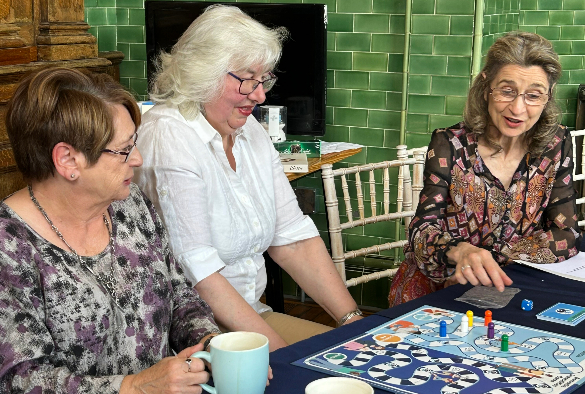
A specialist dementia researcher from the University of Liverpool has worked with partners, people with dementia and carers to develop a board game, shining a light on the inequalities and challenges people face.
The Dementia Inequalities Game has been created by the University of Liverpool, The Lewy Body Society, and third sector representatives in collaboration with people who have lived experience of dementia.
The roll and move style board game takes players on a journey, illustrating barriers that people come up against both pre and post dementia diagnosis as well as the support available and the positive impact this can have. Players can also answer a variety of questions, encouraging teams to consider and discuss issues including the cost of dementia care, and what types of dementia there are including Alzheimer’s disease and Lewy body dementia.
Dr Clarissa Giebel, Senior Research Fellow in the Institute of Population Health at the University of Liverpool and at the NIHR Applied Research Collaboration North West Coast said: “My research at the University primarily highlights challenges people come up against after receiving a diagnosis. It’s our work with partners and those with lived experience that allows us to find the solutions to these issues. We know dementia isn’t fun but this table-top game creates an opportunity for people to come together in an informal way and have open and enlightening conversations.”
Ahead of the game’s formal launch when it can be bought, a group of people with dementia, unpaid carers and dementia specialists and professionals had the opportunity to play the game. Known as the Liverpool Service User Reference Forum (SURF), the group represent the views of people living with dementia and shared their thoughts on the game.
Here members of SURF shared their positive reactions to the game with comments including: “I thought it was true to life” – praising the game’s reflection of people’s lived experiences from both the perspective of those with dementia to those of their carers. Others described the game as “fun” and a helpful way of learning more about the challenges people face.
Watch more here
View this post on Instagram
Jacqueline Cannon, Chief Executive, The Lewy Body Society, who was also at the event, said: “The Lewy Body Society is delighted to be involved in the design and development of this game. It is an innovative way to have the conversation about dementia inequalities. People living with a diagnosis of Lewy body dementia experience problems with diagnosis, mis-diagnosis, care and support.”
The game has been produced primarily for carers, health and social care professionals, and students. However, it can be played by anyone who wants to learn about the obstacles that those who have a diagnosis of dementia and their unpaid carers face. It was developed thanks to Wellcome Trust funding and supported by the NIHR ARC NWC. It is will be available to buy from The Lewy Body Society website with a waiting list now open here for people to register their interest in buying it, once available.
More about the University’s dementia research
More than 900,000 people are living with dementia in the UK, with numbers expected to reach 1 million by 2024. It is one of the main causes of disability later in life, ahead of cancer, cardiovascular disease and stroke. Dementia is a global public health concern, which not only affects the person living with the condition, but their family members and friends.
Researchers at the University of Liverpool are working to provide evidence and highlight the economic, societal and care inequalities that people with dementia face as well as their family, friends and unpaid carers. This has seen Dr Clarissa Giebel contributing to a paper that is the first academic evidence of how the cost of living crisis is impacting people with dementia, showing people were forced to reduce how much they use social care and support services because of cost. The paper – funded by Alzheimer’s Society and the National Institute for Health and Care Research – shows that, of the people with dementia using social care, one fifth reported that they cut down how much they used to save money. Read more about the research here.
Further University work
A recent paper illustrated the need for better legal and financial advice to be given at the point of diagnosis. Read more here.
Dr Giebel has also recently joined a new policy unit to improve dementia prevention, diagnosis and care. Find out more about the NIHR funded work here.